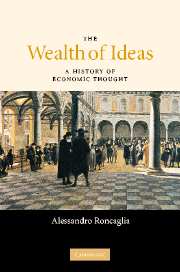Book contents
- Frontmatter
- Contents
- Preface
- 1 The history of economic thought and its role
- 2 The prehistory of political economy
- 3 William Petty and the origins of political economy
- 4 From body politic to economic tables
- 5 Adam Smith
- 6 Economic science at the time of the French Revolution
- 7 David Ricardo
- 8 The ‘Ricardians’ and the decline of Ricardianism
- 9 Karl Marx
- 10 The marginalist revolution: the subjective theory of value
- 11 The Austrian school and its neighbourhood
- 12 General economic equilibrium
- 13 Alfred Marshall
- 14 John Maynard Keynes
- 15 Joseph Schumpeter
- 16 Piero Sraffa
- 17 The age of fragmentation
- 18 Where are we going? Some (very tentative) considerations
- References
- Index of names
- Subject index
7 - David Ricardo
Published online by Cambridge University Press: 22 September 2009
- Frontmatter
- Contents
- Preface
- 1 The history of economic thought and its role
- 2 The prehistory of political economy
- 3 William Petty and the origins of political economy
- 4 From body politic to economic tables
- 5 Adam Smith
- 6 Economic science at the time of the French Revolution
- 7 David Ricardo
- 8 The ‘Ricardians’ and the decline of Ricardianism
- 9 Karl Marx
- 10 The marginalist revolution: the subjective theory of value
- 11 The Austrian school and its neighbourhood
- 12 General economic equilibrium
- 13 Alfred Marshall
- 14 John Maynard Keynes
- 15 Joseph Schumpeter
- 16 Piero Sraffa
- 17 The age of fragmentation
- 18 Where are we going? Some (very tentative) considerations
- References
- Index of names
- Subject index
Summary
Life and works
David Ricardo was born in London in 1772. He was the third of at least seventeen children of a well-to-do stockbroker, a Sephardic Jew. Following the family traditions, from eleven to thirteen years of age David studied in Amsterdam, an important financial centre that had recently lost its supremacy to London, and from where the Ricardo family came (although it seems that its original roots were in Portugal). Back in London at the age of fourteen, David began work in the stock exchange with his father. Soon, however, he was to become the protagonist of a romantic story: falling in love with a young Quaker girl, on reaching the age of twenty-one he married her against his family's wishes, and was disowned. Thus compelled to launch out on his own, thanks to his ability and the connections acquired while working for his father he soon succeeded in reaching an important position in the business community.
It was precisely his work at the stock exchange that prompted him to systematic consideration of the economic vicissitudes of the country. An important stimulus, for instance, came with the suspension of gold convertibility by the Bank of England in February 1797. While on holiday at Bath, in 1799, Ricardo happened to read Smith's Wealth of nations, a book then twenty-three years old but established as the main reference work in the field of economic science. Ricardo was not a scholarly type, but he had a logical mind and sharp intelligence.
- Type
- Chapter
- Information
- The Wealth of IdeasA History of Economic Thought, pp. 179 - 206Publisher: Cambridge University PressPrint publication year: 2005



